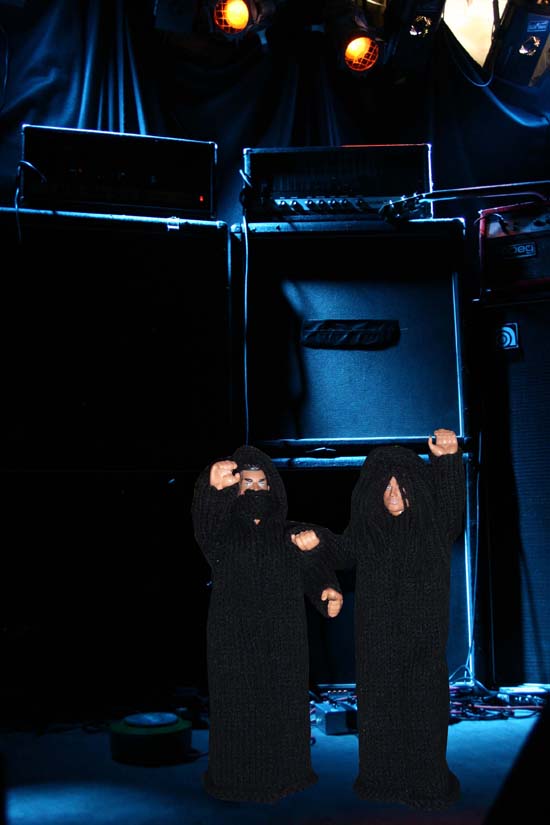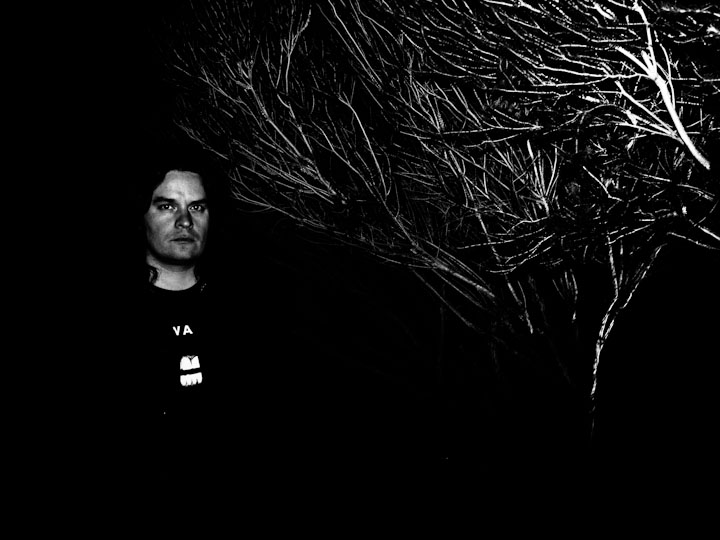It’s a quiet night in Madeira’s Estalgem Da Ponta Do Sol Hotel in early December 2011. Stephen O’Malley sits opposite me, nursing a beer with renewed respect after the damage it did him the previous night. A few days ago I saw him for the first time – sitting alone in the hotel garden while observing a crowd of revellers from a distance – and wondered who the geeky metalhead at an experimental music event like MadeiraDig could be. On the final evening, however – surprisingly fresh-faced under shoulder length hair and now wearing a Swans T-shirt – he took to the stage with Peter Rehberg, boss of experimental label Editions Mego, and – if you’ll pardon my French – tore my mind a new arsehole.
Despite the exhortations of The Quietus’ editorial staff, I had never previously paid much attention to Sunn O))), or any of the vast number of collaborations Stephen O’Malley has undertaken with others over the past decade or so. What I’d heard – essentially the forthcoming reissue of 2000’s debut album, ØØ Void, and little else – had struck me as self-indulgent and, in all honesty, tedious. The night after KTL’s show, however, I found myself standing at the hotel bar telling O’Malley that, “Although I never thought I’d enjoy it, your show was simply astonishing.” He’d accepted the compliment graciously, but then calmly enquired why I hadn’t thought I’d enjoy it. The conversation that ensued provoked us to plan dinner the following evening, his last on the island, to pursue the subject further.
Later that night, I downloaded Sunn O)))’s latest album, Monoliths & Dimensions. I lay in bed with the record on my headphones and found myself astonished once again. But, this time, I also felt ashamed. Ashamed that, on the basis of some cursory experience of only a few minutes of a decade old debut album, I had never allowed myself to encounter the beauty in this colossal, uncompromising masterpiece. The cliché goes that great music, like the wine that inspired O’Malley to move to France, often requires time, and it seemed like this was an overdue reminder to slow down and exercise a little more patience. So, after a friendly meal that revealed O’Malley to be a fascinating and often highly entertaining individual, we returned to the bar, where I switched on my Dictaphone to pick up where we left off a day earlier…
Why do you think people like me are so scared of Sunn O)))?
Stephen O’Malley: I think because reputations are so misleading, especially with music. What you hear about is not the entirety of the sound, what we’re doing. And I think people are afraid of metal music. For many reasons.
John Doran at The Quietus suggested you started out as though you were trying to play a Melvins record as slow as possible.
SOM: That’s exactly what we’re doing.
And that you started out as an Earth tribute band.
SOM: Well, not by definition. But Greg (Anderson) and I were huge fans. The reason why we play music together is we’re super into The Melvins and Earth. Those are like local bands for us, though. We were teenagers seeing The Melvins play. They weren’t a touring band. And originally, when Greg and I started playing together with our first group, we were coming from death metal. Because nothing like that was happening in Seattle, it seemed very exotic. So, really, Sunn O))) formed out of friendship and because we’re huge fans.
So it was an instinctive approach?
SOM: Yeah. I think there were three different starting points for that group, and the first one was when Greg and I met and started playing music together in ‘93. Sunn O))) formed in ‘98, and that was the second one. But really it turned into something more after the ØØ Void album in 2002, 2003, when we started taking it seriously as a live group, and basically tried to do something outside of our little personal space.
ØØ Void is really just a seed. I think it’s recorded well, and it’s our first chance with that group to do something properly in a good studio. Stuart Dahlquist (who co-founded Stephen and Greg’s previous band, Burning Witch) is also playing on it, and there’s some other friends involved just as collaborators, so it’s the start of this collaboration idea that we’ve continued a lot over the years. It’s a great heavy record, but when it came out it got terrible reviews. Until later, when Julian Cope wrote a review about it on his website: it’s hilarious, completely taking the piss out of it. But, in a way, it’s great. He invented his own song titles, and he just took the idea of what we were doing and made a new album out of it. Everything he said was totally spot on, in a way.
And how do you feel about the record?
SOM: Now? I think it sounds great. It’s interesting. For me, it’s not Sunn O)))’s best moment, but it’s important. In the vernacular of our career, the demo we did first has been a major reference point in Sunn O)))’s arc when it’s been written about, but that record, ØØ Void, it came out and it kind of went out of print. A few, maybe a thousand people, had it at the time.
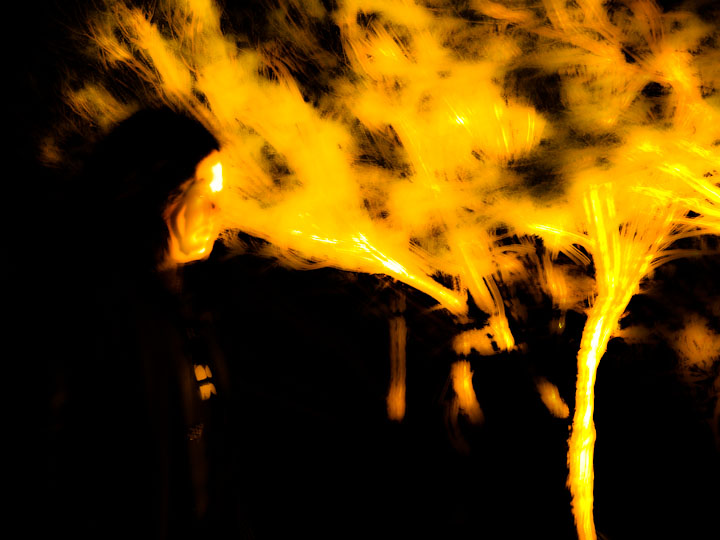
I used the word ‘decay’ when we first spoke to characterise ØØ Void, and you didn’t like that.
SOM: Well, because it doesn’t stop. Decay leads to an end. ‘Sustain’ is actually the word which is more appropriate.
Maybe, but though it’s sustained, I feel like the very essence of each chord, of each sound, is disintegrating.
SOM: Maybe on ØØ Void that’s what it was. It was decaying because I don’t think we had our guitars set up properly, and our gear wasn’t really worked out. And that’s why I think ‘sustain’ is actually more accurate: we were trying to create sustained sound. This is why the tracks are as long as they are, why the speed of the compositions is so absurdly slow, that’s why the tuning’s lower. That’s a good way to put it, what you said (earlier): it’s like a slow motion film, death played in slow motion. But on the other hand, it’s not about slowing something down, because we’re still in the same timeframe, and then that gets even more interesting, actually, with the live experience, because there’s a real different sense of time at our concerts and stuff, I think. The sensory overload can create a different space, and a different perception. And I think that’s what I mean by us being different from other super-loud bands.
You talk about composition, but to me writing involves structure. The concept of structure with your music is entirely different.
SOM: But it’s very essential, structure. With Sunn O))), it’s about creating physical sound mass rather than creating bridges. The physical aspect of the structure is really much more physical and present. It’s not about loud and loudest. It’s about scale and size. It demands something of the audience that involves a mental physical stamina – not in a macho way, or a sport thing – because this requires you to slow yourself down and listen in a way that people were listening to music most of the time except the last forty years. Because that’s a new experience for a lot of people who are huge music fans: long-form music. Why?
So how do you define when a song is ready to be recorded?
SOM: That’s a good one! Ha! With Sunn O))), literally, it might be even more of a sculptural process, that we’re in the studio, tracking our ideas fresh, and then the form comes later with the production. Or it’s just as it is. Do you consider improvised music to be non-structural?
Well, sometimes it seems like it’s just about finding a way to kill 45 minutes on stage…
SOM: That happens with improvisation, though. It doesn’t always work. With improvisation, whatever emotional state you’re in is going to affect what you create on the spot. And a lot of other factors as well. So that structure can be widely different for the same person, even in the same set. So usually that’s when it’s the most interesting. That’s one of the reasons I like playing. We have one song on Monoliths & Dimensions, ‘Agartha’, which we’ve played live for, like, two or three years now, and it changed massively. It was actually formed on stage at some point, at least the main riff, in one of our exchanges when we were playing. Then we made a recorded version and added all this other instrumentation, and then we went back and brought it back to a live situation and didn’t have the instrumentation, but Attila [Csihar, Mayhem vocalist] was featured more doing a vocal improvisation, which I never thought would happen in a Sunn O))) concert. A vocal improvisation?!
That’s one difference between ØØ Void and the band now: vocals. But that track has continued to develop. That track is now like 45 minutes long. It has all these other passages, different sounding stuff. The form of that, in a way, is the best possible example of what a Sunn O))) track can be because it has a foundational skeleton – that’s the word we use – but then it has a real flexibility at different points to try different things out, depending upon who’s playing. We did a couple of tours with Steve Moore, who plays in Earth. He’s a trombone player and a keyboardist, and he’s playing Rhodes and trombone and Hammond and Korg MS20. And, wow! There were all these different parts that happened during those tours, and it would change, and we were able to try these different minimal harmonic sections with the vocals, and some guitar harmonics, brass.
But structurally, even the most composed music, like Stravinsky, is played differently, of course. It’s just a different language. And the language that Sunn O))) developed in the last ten years is based around taking risks and going into new areas where you don’t know what’s going to happen. And it could be bad, but the chemistry we have as people, as musicians, somehow usually presents brilliant surprises rather than falling out of space.
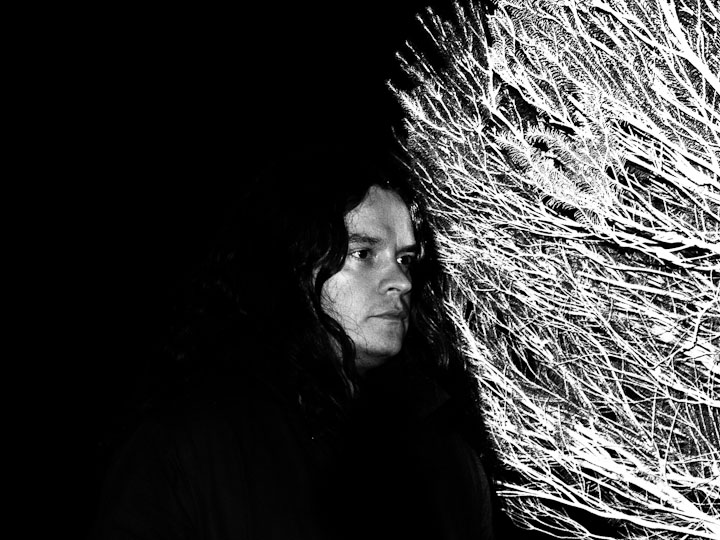
I was especially impressed by the second track of the album, ‘Big Church (Megszentségteleníthetetlenségeskedéseitekért)’. Someone warned me that it reduced them to tears, and it floored me too, especially the moment with the church bell.
SOM: It’s actually a tubular bell recorded at Ennio Morricone’s studio. From The Good The Bad & The Ugly. It’s the same instrument, actually.
What it made me think of was Arvo Pärt…
SOM: Great! Yeah! There have been a lot of Arvo Pärt references made, and I’ll tell you, we didn’t talk about Arvo Pärt once with the arranger or within the group, although I’m a fan of several recordings and pieces of Arvo Pärt. And actually I saw an interview with an Estonian newspaper where they interviewed him and played him that track. And he commented on it! This kind of stuff happens to Sunn O))). It’s amazing! It’s incredible! Wow! First of all, that he would encounter our music, but second of all, that he talked about it. But of course what he said was, “Oh, that’s good, they’re kind of taking my ideas and using them”. It’s like, “No! It’s an instrument. It’s a bell.”
There was also something else I wasn’t expecting: silence.
SOM: These kind of dynamics… It’s pretty basic in a lot of ways, but with that group, it’s pretty hard… It’s like if you’re driving down this hill at 200 km/h, and you’ve got to stop. I mean, there’s so much momentum and energy when that group is going that stopping like that is pretty exhilarating, actually.
So what do you say to people that, like I did, consider the volume at which you play to be little more than a gimmick?
SOM: That’s a valid point of view, actually, but when you’re a guitar player, you’re not only playing guitar, you’re playing amps. I mean, when you’re an electric guitar player, of course! But that’s part of the sound, the volume. You know Matt Sweeney? He’s one guy I can think of who’s, like, after a concert, “You know I’ve been wanting to do that basically my whole career? That’s the best thing: to get all your gear on stage, open it up at full volume, play slow with harmonic saturation, it’s like a dream.”
I was intimidated by the thought of the volume…
SOM: Why are you intimidated?
Firstly, for purely health reasons. And, secondly, because… it’s unnecessary.
SOM: Why?
Well, for starters, volume increases the adrenalin flow, so it strikes me as cheating. It’s like a cover for failing to be able to achieve anything else…
SOM: Or it’s a tool to drive that form. To create physical sound phenomena requires a lot of energy, especially the low frequencies.
Well, it still suggests a lack of imagination.
SOM: Well, I could say we’re not technically the greatest guitar players… [laughs]
But the way it’s written about… People need…
SOM: …to validate it. For themselves.
You can always intellectualise something, but it will always have an emotional quality because music is not rational. It can be, when you’re talking about pop music and stuff like that. A lot of composers are very rational and the whole serialist thing is attempting to be as rational as possible. But that’s not all it is. The abstract elements in music are impossible to intellectualise correctly.
The last time I remember being stopped in my tracks by music comparable to yours was Caspar Brötzmann. That Koksofen album…
SOM: I love that record! Caspar Brötzmann Massaker was one of the first groups that Greg introduced me to when we started playing music. I turned him on to Disembowelment, and some other death metal bands. And he turned me on to Caspar Brotzmann, Slint and The Obsessed. That was like our first trade…
I went to see him live, and it just blew me away, man. First of all he’s huge, and I’d never seen anyone play guitar like that – as a percussive instrument as well as a string instrument – and achieve these sounds. And I saw him play again two years later with FM Einheit as a duo. The record’s pretty cool, that Merry Christmas record, but live it was just fucking A! Where are these sounds coming from? I don’t even know! It’s like there’s a whole other soundtrack happening to what’s going on.
I read somewhere that you used to play behind a wall of amplifiers and that the end of the show was signified by one of you putting your fist up above them.
SOM: Well, almost. I actually read an interview Greg did about that period recently which refreshed my memory, because the live show has turned into this whole other thing since then. That was the first tour we ever did, and that was in the UK in 2000, and it was right before ØØ Void came out, but we were playing that material as a trio with Stuart Dahlquist. And basically it was just us. Sunn O))) wears robes on stage in the last years and stuff, but it was just us in our regular clothes standing in front of the amps, and people were really not into it. We were opening for Greg’s other band, Goatsnake, and Orange Goblin were the headliners on the tour, so people would want to hear, like, some quirky doom music, and then we played for 20 minutes and people were, like, “Fuck you, what are you doing? It’s stupid.”
But we liked what we were doing on the tour, and we didn’t want to stop playing the shows, so we decided that visually it’s boring, because the audience just sees three guys standing up playing. So we decided, “Why don’t we just make the amps the band?” So we put the amps in front and played behind. And when we started doing this, we were, like, “Oh, cool. This is so much more liberating and we can concentrate on it more.” And then, “Let’s lay down behind the amps, because the floor’s vibrating anyway so we can work the feedback that way.” And then it was, like, “Let’s take a nap during the sets." And I think we played the (Camden) Underworld, and I remember that I slept at least ten minutes of the set. But that was like the best show, an amazing show for us, because one guy from Terrorizer loved it and wrote about it. He was laying down on the ground in the audience.
But then, after, we were, like, “This is ridiculous. We don’t want to hide behind the amps.” So we decided to mask ourselves, because we don’t want it to be about us. So we were, like, “Let’s use a fog machine. Let’s do some robes.” But then it turned into, like, “OK, now we have a uniform”, and it brought up that whole ceremonial aspect to what we’re doing live, which was really strong and eventually really important to the whole structure. But it also gave people something to push away from. “This is retarded. This is pretentious.” [Laughs] When we were designing them, I made a sketch on a napkin, but I accidentally wrote ‘feet’ instead of ‘inches’. So the first robes actually had these huge trains on them…
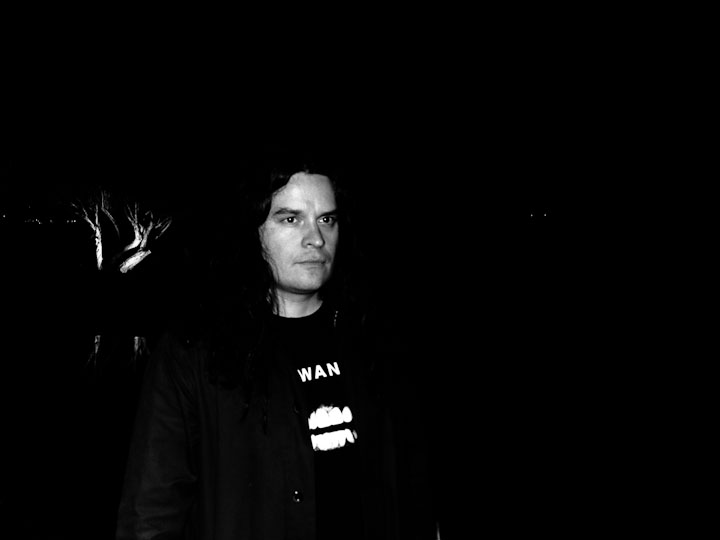
What do you think has been your finest Spinal Tap moment?
SOM: There have been a lot of embarrassing things that have happened. I don’t want to think about it too much. There has been some retarded backstage action, of course. I’m surprised there hasn’t been more serious damage. Just being a musician on tour is totally Spinal Tap. That’s why that film is total genius, because it makes it laughable in terms of the problems you have.
What about playing in a cathedral in Norway and having the choir director – who’s the music programmer – arguing with the administration of the church and representatives of the Bishop Of Bergen, because the only decision that a Bishop doesn’t control in a church is the music programming? So the programmer wanted us to play because he understood other things about our music that he liked. Because he’s a fan of Messiaen, actually. And the administration were, like, “We can’t have a band where the singer is in a black metal band called Mayhem and have fog machines in [our] church”.
That goes down as a Spinal Tap moment. We played there, and the church was full, and it was an amazing concert, amazing reaction, and then the administration was, like, “That was amazing! Look how many people were in the church!”
Do you listen to a lot of classical?
SOM: Recently I was turned onto Beethoven’s string quartets, which I’d never listened to before. I was turned onto it by a Romanian composer I’m friends with who’s in his late 60s, and his music is really far out contemporary. We were driving to Bucharest, which is far from the country house that he lives in, and he’s, like, “Do you mind if I play some music?” I’m really curious: he’s going to introduce me to some obscure Romanian composer. And he’s playing it, and I didn’t know what it was. Twenty minutes later he turns to me and says, “Does this make you nervous? This is Beethoven.” “Wow, you’re playing Beethoven?” “Yes, this is some of the most brilliant music ever made.”
So what can we expect from Sunn O))) in the near future?
SOM: There’s a record we were working on a couple of years ago, collaborating with that band Ulver from Norway. I’ve been friends with the singer for almost 20 years, actually. I went back to that with Kris Rygg, the singer: we were working on mixing that. There’s also some material we were mixing during the Monoliths sessions. There were seven tracks we were working on, but we decided to focus on four tracks, so there are still three tracks that are linked that we might get back to. But Greg and I started writing some new material too. And Monoliths took so much time and money, that I can’t imagine we’d return to working that way on another record. It just took so long.
And it brought you to the brink of bankruptcy, too.
SOM: I think so. It was very expensive. Took a lot of resources.
I saw you used a conch player…
SOM: Yeah, well that’s Stuart Dempster, the trombone player. They’re beautiful, from India or something, and they sound great too.
There can’t be many conch players in the world. They must have been queuing up for the job.
SOM: [Laughs] Yeah, there’s a union actually. They’re very strict about their social contributions.
Can you ever imagine having Sunn O))) action figures?
SOM: There’s some lady that made these dolls, actually. They’re knitted. I’d love to do that. Wouldn’t that be great? An Attila action figure?! You could have all the different costumes he has. Have you seen photos of that costume? I mean, it gets pretty close to absurd. But the thing is, you don’t have to see it as absurd.
What role do drugs play in your music?
SOM: They used to play a lot. Now, not so much. In the first years, we’d take a lot of pills. Alcohol has always been a big thing with the band, as you can imagine. Wine. We drink wine pre-show, post-show and during the show.
So the show’s over when the bottle’s empty?
SOM: Nah, it goes faster! Not just me: Greg’s a big fan of wine too!
ØØ Void is out on CD now and on vinyl at the end of the month via Southern Lord
